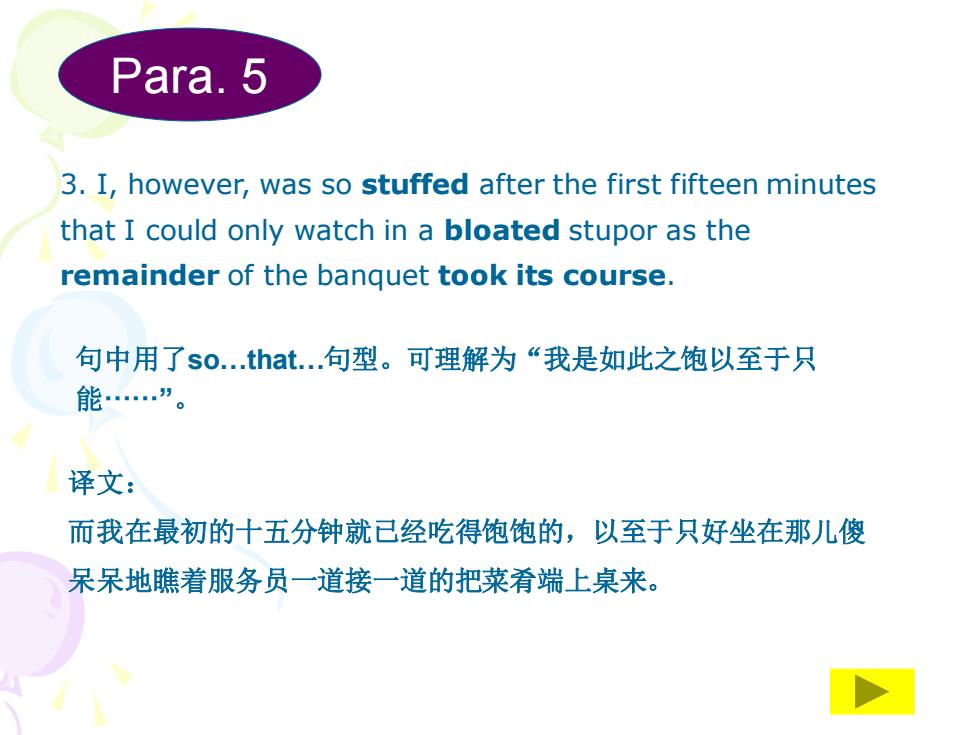
Para.5 3.I,however,was so stuffed after the first fifteen minutes that I could only watch in a bloated stupor as the remainder of the banquet took its course. 句中用了so.that.句型。可理解为“我是如此之饱以至于只 能…”。 译文: 而我在最初的十五分钟就已经吃得饱饱的,以至于只好坐在那儿傻 呆呆地瞧着服务员一道接一道的把菜肴端上桌来
3. I, however, was so stuffed after the first fifteen minutes that I could only watch in a bloated stupor as the remainder of the banquet took its course. Para. 5 译文: 而我在最初的十五分钟就已经吃得饱饱的,以至于只好坐在那儿傻 呆呆地瞧着服务员一道接一道的把菜肴端上桌来。 句中用了so…that…句型。可理解为“我是如此之饱以至于只 能······”
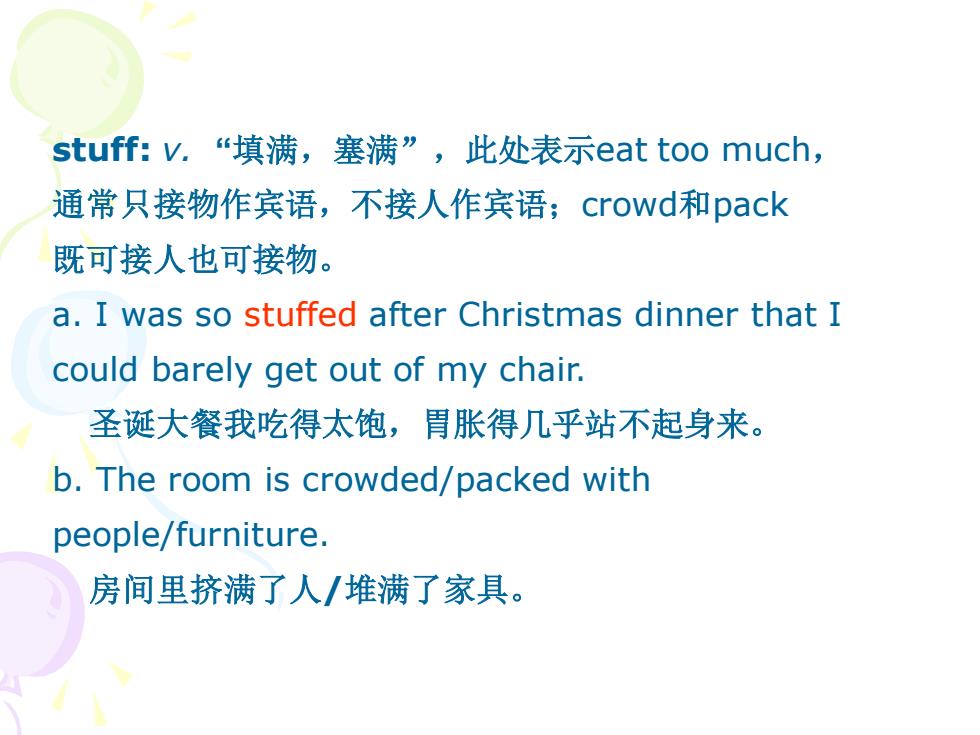
stuff:V.“填满,塞满”,此处表示eat too much, 通常只接物作宾语,不接人作宾语;crowd和pack 既可接人也可接物。 a.I was so stuffed after Christmas dinner that I could barely get out of my chair. 圣诞大餐我吃得太饱,胃胀得几乎站不起身来。 b.The room is crowded/packed with people/furniture. 房间里挤满了人/堆满了家具
stuff: v. “填满,塞满”,此处表示eat too much, 通常只接物作宾语,不接人作宾语;crowd和pack 既可接人也可接物。 a. I was so stuffed after Christmas dinner that I could barely get out of my chair. 圣诞大餐我吃得太饱,胃胀得几乎站不起身来。 b. The room is crowded/packed with people/furniture. 房间里挤满了人/堆满了家具

bloated > ad,过大的 e.g. I've had so much to eat;I feel absolutely bloated. 我吃得过多,肚子胀的不得了
➢ adj. 过大的 e.g. I've had so much to eat; I feel absolutely bloated. 我吃得过多,肚子胀的不得了。 bloated
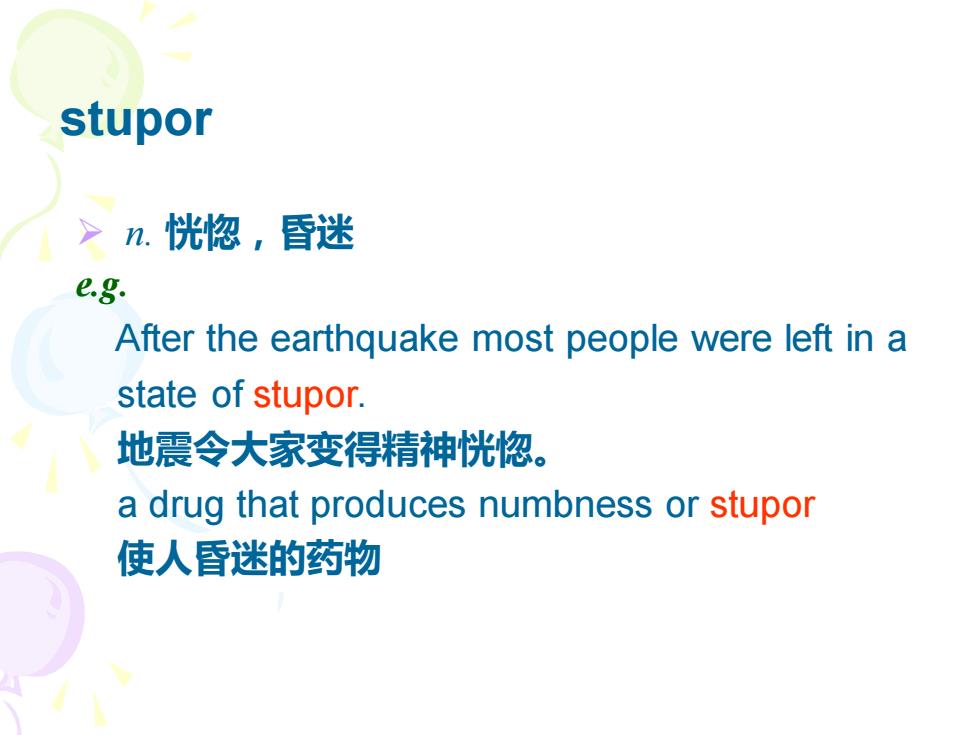
stupor >n.恍惚,昏迷 e.g. After the earthquake most people were left in a state of stupor. 地震令大家变得精神恍惚。 a drug that produces numbness or stupor 使人昏迷的药物
➢ n. 恍惚,昏迷 e.g. After the earthquake most people were left in a state of stupor. 地震令大家变得精神恍惚。 a drug that produces numbness or stupor 使人昏迷的药物 stupor
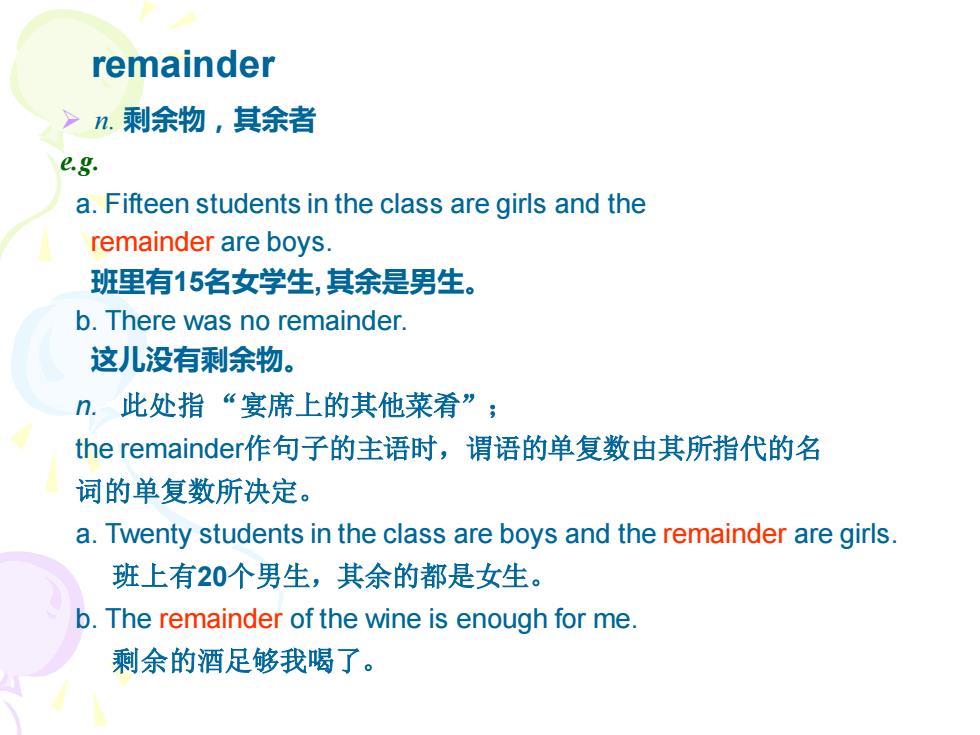
remainder >n.剩余物,其余者 e.g. a.Fifteen students in the class are girls and the remainder are boys 班里有15名女学生,其余是男生。 b.There was no remainder. 这儿没有剩余物。 n.此处指“宴席上的其他菜肴”; the remainder作句子的主语时,谓语的单复数由其所指代的名 词的单复数所决定。 a.Twenty students in the class are boys and the remainder are girls. 班上有20个男生,其余的都是女生。 b.The remainder of the wine is enough for me. 剩余的酒足够我喝了
➢ n. 剩余物,其余者 e.g. a. Fifteen students in the class are girls and the remainder are boys. 班里有15名女学生, 其余是男生。 b. There was no remainder. 这儿没有剩余物。 remainder n. 此处指 “宴席上的其他菜肴”; the remainder作句子的主语时,谓语的单复数由其所指代的名 词的单复数所决定。 a. Twenty students in the class are boys and the remainder are girls. 班上有20个男生,其余的都是女生。 b. The remainder of the wine is enough for me. 剩余的酒足够我喝了
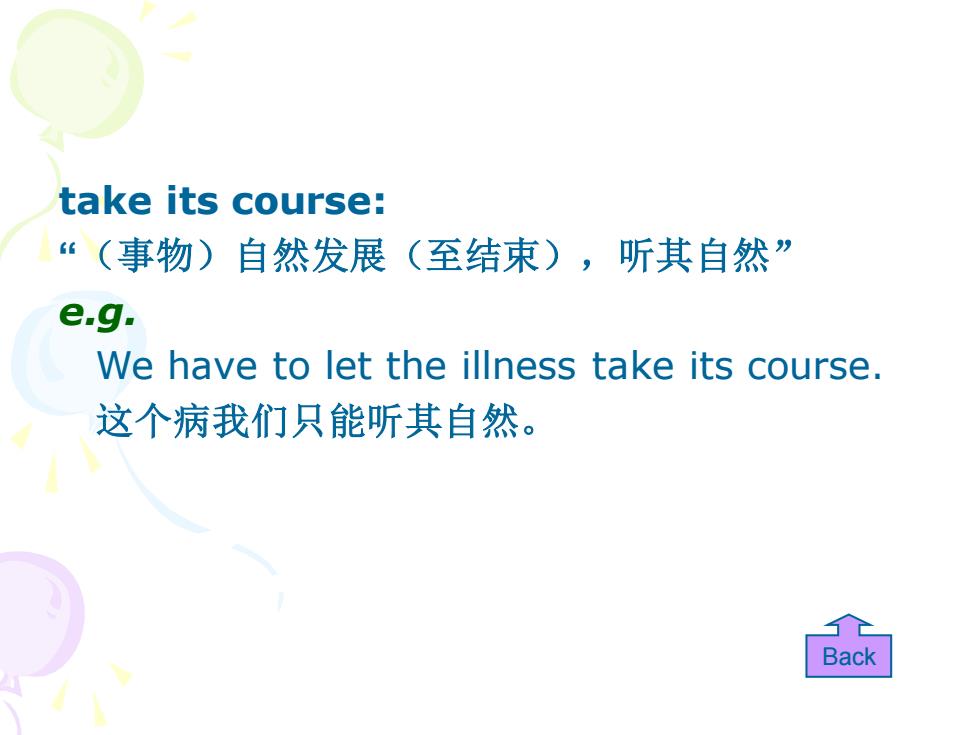
take its course: “(事物)自然发展(至结束),听其自然” e.g. We have to let the illness take its course. 这个病我们只能听其自然。 Back
take its course: “(事物)自然发展(至结束),听其自然” e.g. We have to let the illness take its course. 这个病我们只能听其自然。 Back
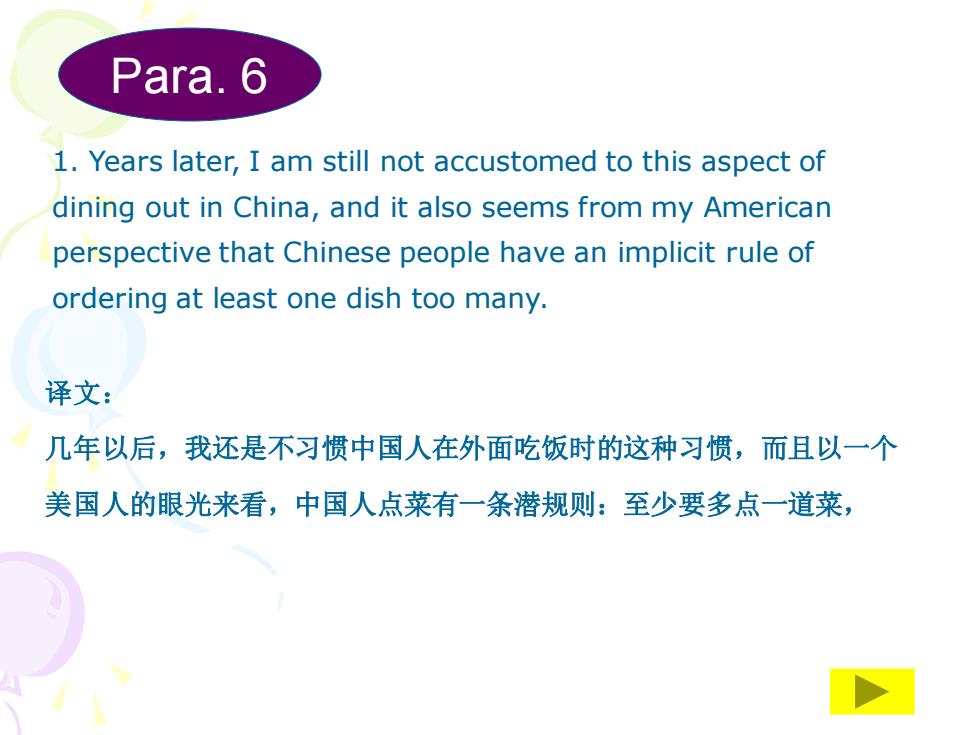
Para.6 1.Years later,I am still not accustomed to this aspect of dining out in China,and it also seems from my American perspective that Chinese people have an implicit rule of ordering at least one dish too many. 译文: 几年以后,我还是不习惯中国人在外面吃饭时的这种习惯,而且以一个 美国人的眼光来看,中国人点菜有一条潜规则:至少要多点一道菜
1. Years later, I am still not accustomed to this aspect of dining out in China, and it also seems from my American perspective that Chinese people have an implicit rule of ordering at least one dish too many. Para. 6 译文: 几年以后,我还是不习惯中国人在外面吃饭时的这种习惯,而且以一个 美国人的眼光来看,中国人点菜有一条潜规则:至少要多点一道菜
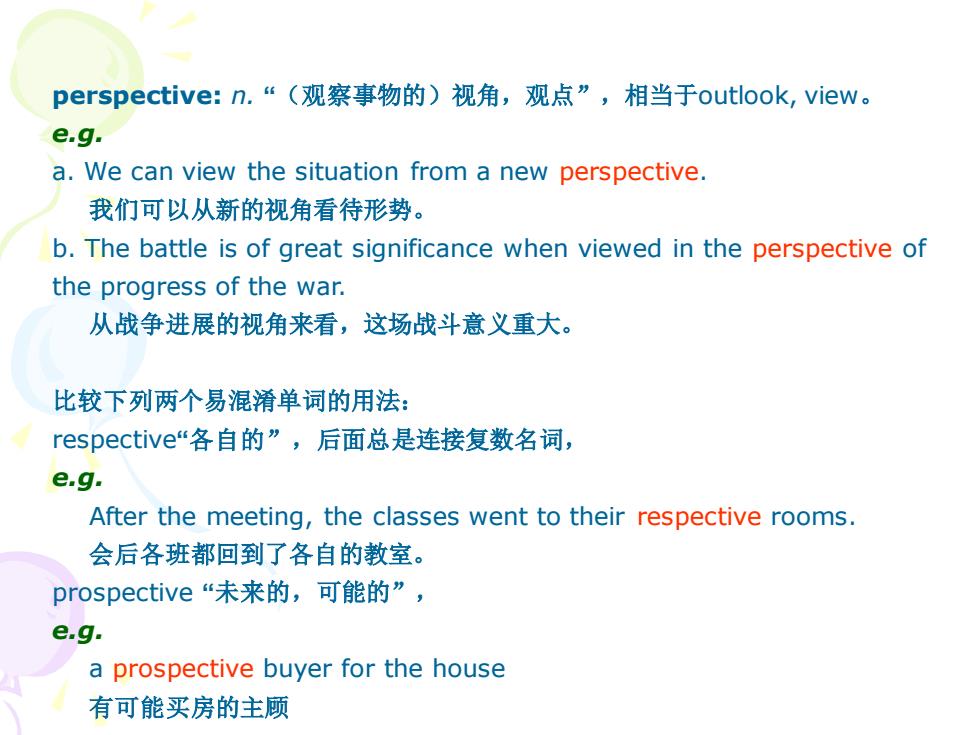
perspective:n.“(观察事物的)视角,观点”,相当于outlook,,view。 e.g. a.We can view the situation from a new perspective. 我们可以从新的视角看待形势。 b.The battle is of great significance when viewed in the perspective of the progress of the war. 从战争进展的视角来看,这场战斗意义重大。 比较下列两个易混淆单词的用法: respective“各自的”,后面总是连接复数名词, e.g. After the meeting,the classes went to their respective rooms. 会后各班都回到了各自的教室。 prospective“未来的,可能的”, e.g. a prospective buyer for the house 有可能买房的主顾
perspective: n. “(观察事物的)视角,观点”,相当于outlook, view。 e.g. a. We can view the situation from a new perspective. 我们可以从新的视角看待形势。 b. The battle is of great significance when viewed in the perspective of the progress of the war. 从战争进展的视角来看,这场战斗意义重大。 比较下列两个易混淆单词的用法: respective“各自的”,后面总是连接复数名词, e.g. After the meeting, the classes went to their respective rooms. 会后各班都回到了各自的教室。 prospective “未来的,可能的” , e.g. a prospective buyer for the house 有可能买房的主顾

implicit rule:“潜规则” one.too many:“多余的一个…,不需要的一个.” e.g. Don't pay attention to him.He has drunk one glass of wine too many. 别管他,他多喝了一杯。 Back
implicit rule: “潜规则” one…too many: “多余的一个······,不需要的一个······” e.g. Don’t pay attention to him. He has drunk one glass of wine too many. 别管他,他多喝了一杯。 Back

Para.6 advocate宾语 2.“Enough”is never“enough".The wastefulness of tnis practice has been criticized in China recently,and some advocate prdering more sensible quantities,or at least taking the leftovers home in a"doggie bag"but there remains a deeply-ingrained tendency on the part of a host to provide much more than the guests could possibly eat. advocate宾语 译文: “适可而不止”。这种浪费行径近来在中国也一直遭受批评。有人提出点 菜 要适量,至少要把剩菜打包带回家。然而这种根深蒂固的倾向仍然残留: 对主人来说,提供的饭菜要多得让客人吃不完才好
2. “Enough” is never “enough”. The wastefulness of this practice has been criticized in China recently, and some advocate ordering more sensible quantities, or at least taking the leftovers home in a “doggie bag”, but there remains a deeply-ingrained tendency on the part of a host to provide much more than the guests could possibly eat. Para. 6 译文: “适可而不止”。这种浪费行径近来在中国也一直遭受批评。有人提出点 菜 要适量,至少要把剩菜打包带回家。然而这种根深蒂固的倾向仍然残留: 对主人来说,提供的饭菜要多得让客人吃不完才好。 advocate 宾语 advocate 宾语